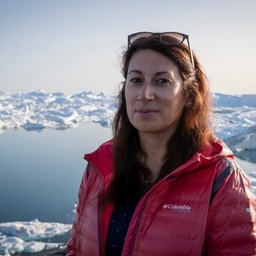
Nada Farhoud
Environment Editor and Columnist at The Daily Mirror
Environment Editor & columnist @dailymirror 💚 SoE’s Environment Journalist of Year. Occasional twitcher 🦅 Lives by the sea 🌊
Articles
-
1 week ago |
msn.com | Nada Farhoud |Adam Cailler
Microsoft Cares About Your PrivacyMicrosoft and our third-party vendors use cookies to store and access information such as unique IDs to deliver, maintain and improve our services and ads. If you agree, MSN and Microsoft Bing will personalise the content and ads that you see. You can select ‘I Accept’ to consent to these uses or click on ‘Manage preferences’ to review your options and exercise your right to object to Legitimate Interest where used.
-
1 week ago |
mirror.co.uk | Nada Farhoud
Pressures on the public water supply include the climate crisis, population increases and emerging technologies, as well as the need to generate energy and to grow foodEngland’s public water supply could be short by five billion litres a day by 2055 without urgent action to future-proof resources, the Environment Agency has warned.
-
4 weeks ago |
msn.com | Nada Farhoud
Microsoft Cares About Your PrivacyMicrosoft and our third-party vendors use cookies to store and access information such as unique IDs to deliver, maintain and improve our services and ads. If you agree, MSN and Microsoft Bing will personalise the content and ads that you see. You can select ‘I Accept’ to consent to these uses or click on ‘Manage preferences’ to review your options and exercise your right to object to Legitimate Interest where used.
-
4 weeks ago |
msn.com | Nada Farhoud
Microsoft Cares About Your PrivacyMicrosoft and our third-party vendors use cookies to store and access information such as unique IDs to deliver, maintain and improve our services and ads. If you agree, MSN and Microsoft Bing will personalise the content and ads that you see. You can select ‘I Accept’ to consent to these uses or click on ‘Manage preferences’ to review your options and exercise your right to object to Legitimate Interest where used.
-
4 weeks ago |
mirror.co.uk | Nada Farhoud
Reservoir plans fast-tracked as Britain could run out of drinking water 'in next decade'The Environment Agency has predicted a shortfall of almost five billion litres a day by 2050 as drier summers caused by the climate crisis has put the country at riskWithout any new reservoirs parts of the UK would have been forced to experience extreme rationing to ensure there was enough drinking water, the government has warned.
Try JournoFinder For Free
Search and contact over 1M+ journalist profiles, browse 100M+ articles, and unlock powerful PR tools.
Start Your 7-Day Free Trial →X (formerly Twitter)
- Followers
- 5K
- Tweets
- 3K
- DMs Open
- Yes

RT @FurFreeAlliance: Major milestone: Switzerland shuts the door on cruelly produced fur🎉 Starting July 2025,🇨🇭will become the first count…

RT @philip_ciwf: Calls to end 'one of the most severe forms of animal cruelty in UK' “Controversial practice of farrowing crates used afte…

RT @humaneworlduk: Yesterday at our event in Parliament, MPs and Peers heard from experts about why the controversial practice of caging mo…